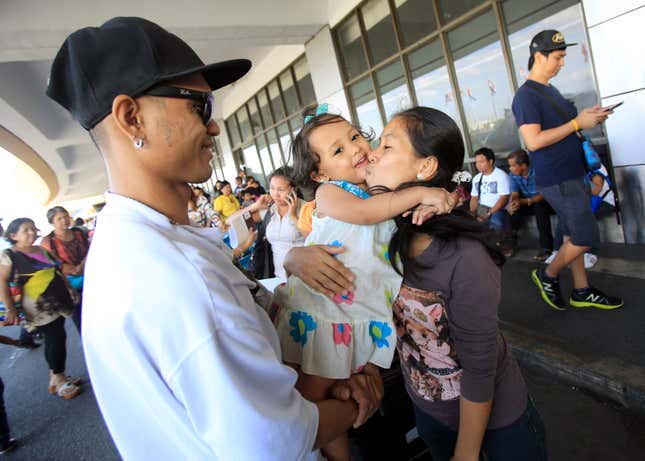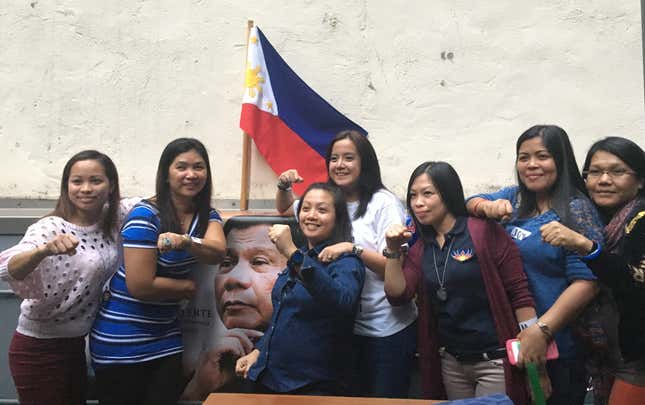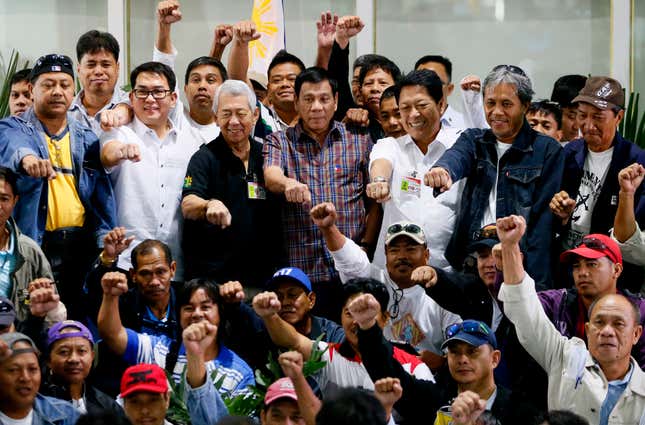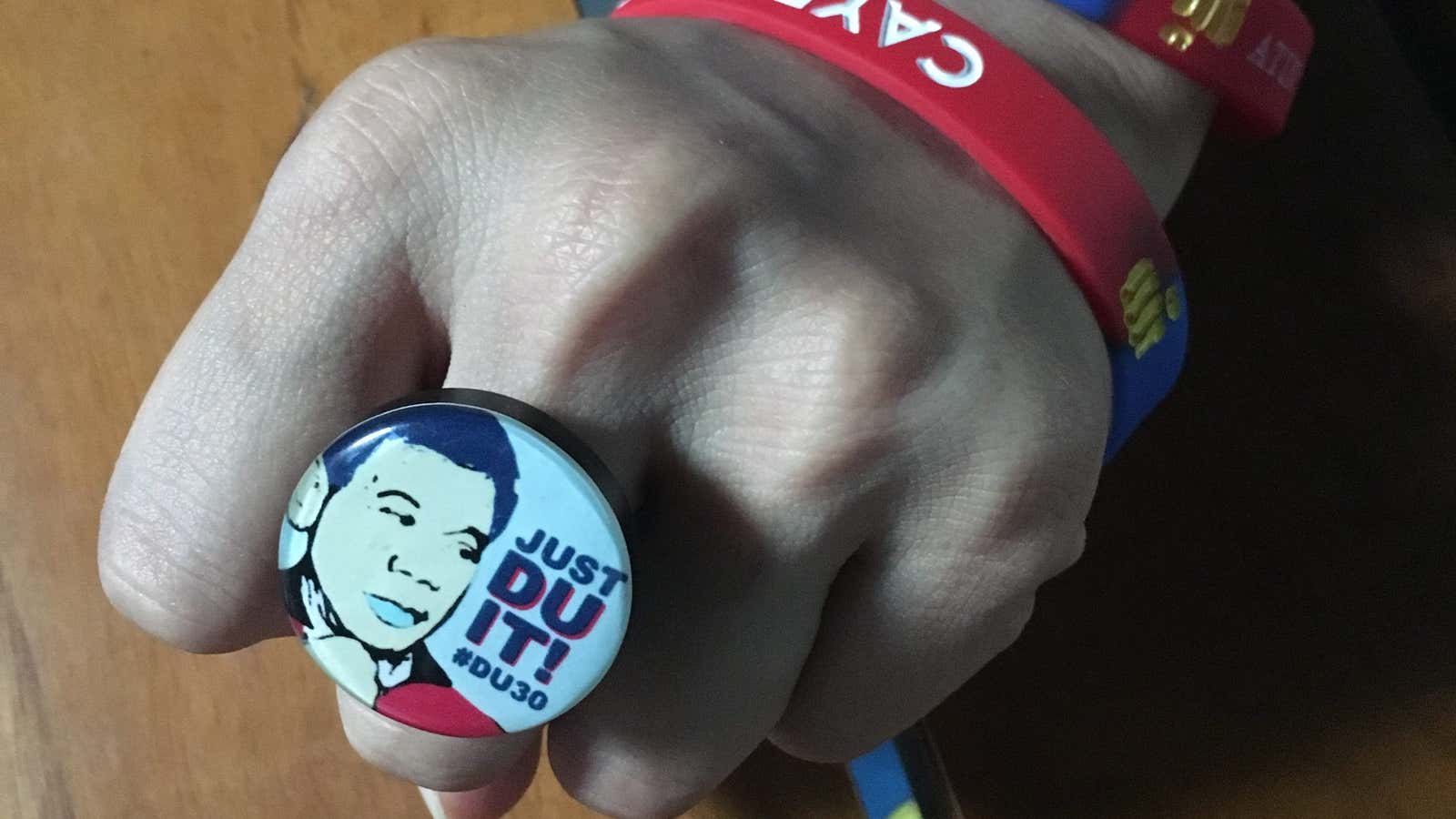Hong Kong
Ever since Rodrigo Duterte became president of the Philippines in May, Ces, a 32-year-old Filipino domestic worker in Hong Kong, said she feels “very happy to go home.”
That’s because Duterte has done something to stamp out one of her biggest fears about flying back to Manila: “bullet planting.” Airport officials would extort huge bribes from travelers, after surreptitiously inserting bullets in their luggage and then detaining them for illegally carrying live ammunition. One Filipino domestic helper on her way back to her job in Hong Kong fell victim to the trap last year.
“I carried my bag like a baby,” Ces, who has worked in Hong Kong for two years after a stint in Kuwait, said of her previous trips home. Last year when she went home she kept pictures of Duterte, then the mayor of Davao City, in her bag so that anyone who opened it would be afraid.
Duterte’s bloody crackdown on drugs and insults of former allies have sparked criticism, but his staunch support of the rights of Filipinos working overseas—known as Overseas Filipino Workers, or OFWs—has won him widespread support from the community. They were key to him clinching the presidential election in May, and, interviews with over a dozen workers in Hong Kong show, remain among his most loyal fans.
They’re also one of the country’s economic engines. Over 10 million Filipinos working abroad send back billions of dollars every year, contributing around 10% of the country’s GDP.
Despite their hefty contributions to the economy, at great personal and social cost, many OFWs say previous presidents have not taken their plight seriously. Duterte, though, has cracked down on the airport scam, streamlined the red tape involved with working overseas, and is promising the ultimate dream for many—a domestic economy so good they no longer need to leave their families to work again. This will be the last generation of OFWs, he has promised.

Previous presidents “only paid lip service to providing assistance and honoring the contributions” of OFWs, said Noel Pangilinan, an adjunct professor at the College of Mount Saint Vincent in New York who teaches Philippine history. Since the Ferdinand Marcos regime adopted the Labor Export Policy in the 1970s, “no Philippine government ever drafted a program to bring them home,” he said, “because they bring in money that props up the economy.”
During his presidential campaign, Duterte warned the staff of Manila’s Ninoy Aquino International Airport about bullet planting. “Everyone linked with bullet planting, kindly consider yourselves retired from government service,” he said. Then, he threatened to force anyone caught practicing the scam to swallow the bullets.
It didn’t come to that. Shortly after his inauguration, the president banned authorities from detaining passengers caught with bullets. This got rid of the fake investigation process, and scammers’ ability to intimidate and extort money from victims afraid of missing their flights or being charged. In Duterte’s first 100 days in office, transportation authorities said, there were zero reports of bullet planting.
Duterte’s Hong Kong fan club
Ces—who does not want to use her real name for fear of being attacked by Duterte’s numerous opponents on social media—belongs to the Hong Kong branch of a Duterte support group with 172 chapters around the world. She, like many others in the group, comes from Duterte’s hometown of Davao City, in the troubled southern part of the Philippines that has been long-neglected by the central government.
At an outdoor patio area of a Starbucks on a recent Sunday, the statutory day off for domestic helpers in Hong Kong, the group gathered to celebrate the birthday of Filipino senator Alan Peter Cayetano, a staunch Duterte ally and running mate. There was a chocolate cake with candles, a round of “Happy Birthday,” and a banner of Duterte and Cayetano hung on a nearby wall. Some wore big Duterte rings on their hands, and had Duterte stickers on their phones.
The women vigorously nodded in agreement at Ces’s bullet-planting fears, nearly all teared up as they discussed the husbands and children they had left behind, and were unanimous in one belief—that Duterte is the man who will give dignity and choice to the millions of OFWs around the world.
They call him Ang Huling Baraha, which in Tagalog means “the last card”—their only hope.

“He feels our feelings, he walks in our shoes,” said 43-year-old Jennifer Daproza, the leader of the Hong Kong chapter, who works in an international school. “My vision is that being an OFW will just be an option in the future,” she said, decked out in clothing printed with Duterte’s face. Daproza’s husband lives in Manila, and was part of a traveling band of musicians with Duterte’s presidential campaign. She hopes to return home for good in five years.
The women are dismissive of any criticism of Duterte, attributing it to misleading or false reports about him in the mainstream Filipino media. Most get their news only from blogs, they said. Some say the killings associated with his drug crackdown were carried out by police out of self-defense. Others believe drug pushers deserve their punishment, and that any collateral deaths are unfortunate.
Duterte’s critics fail to understand that as mayor, he transformed Davao City from a crime-ridden no-man’s land to what some consider the Singapore of the Philippines, his Hong Kong fans say. Ces said one of her brothers is a drug user in Davao City, so she fiercely welcomes Duterte’s tough stance on drugs.
Pro-Duterte meetings like the one in Hong Kong are happening around the world, thanks to the widespread Filipino diaspora. As of 2013, there were over 10 million OFWs, according to the Philippine Overseas Employment Administration (POEA). There are about 173,000 Filipinos working as domestic helpers in 2015 in Hong Kong, and the city isn’t even among the top five destinations.
In Hong Kong, Filipino domestic helpers earn around HK$4,110 a month ($530), three times the average non-agricultural monthly wage of $171 at home, according to Philippine government data.
The OFWs’ one-stop shop
In some cases, helping Filipinos working abroad has been as simple as streamlining bureaucracy. During a labor rally weeks before the May election, Duterte said that workers shouldn’t have a difficult time processing their application to go overseas, and that all required permits should be available in one building. That resulted in an OFW “one-stop shop” being opened in August in Manila, which had served 137,429 people as of Oct. 21, according to the POEA (pdf). There are plans to open more outside of Manila too.
Before that, processing an application was a Herculean task that could take months and was extremely costly. Many OFWs come from provinces around the Philippines, and had to find room and board in the capital for the duration of the application process, as well as travel around sprawling, congested Manila to gather their paperwork.
Tin, another member of the Hong Kong group who didn’t want to use her real name, said she waited almost four months to process her papers in Manila before arrived here as a domestic helper. The 33-year-old spent some 100,000 pesos (about $2,000) in the effort. The trip from her factory workplace into the capital took two hours—and she had to make it frequently. The whole process was humiliating, she said tearfully. Still, Hong Kong wages are so much higher than what she can earn at home, that Tin stuck with it. Now she has a nine-year-old daughter in the Philippines who she sees only once every two years.
Duterte also promised throughout his campaign to start a fund of one billion pesos for every region in the Philippines to help micro, small, and medium enterprises, which is especially beneficial for OFWs who want to start their own business upon returning home. The Department of Trade and Industry’s plan for 2017 said it is devoting half of its 4.8 billion peso budget toward the initiative, with plans to promote products manufactured by small businesses in the country.
Duterte has been actively trying to help overseas workers facing difficulties abroad, too. A month-long government mission in August also aimed to help an estimated 11,000 OFWs stranded in Saudi Arabia, after their employers broke contracts as the local economy suffers under low oil prices. The problem is being compounded by Riyadh’s “Saudization” program, which aims to gradually replace foreign workers with locals, said Migrante International, an alliance founded by OFWs.
Duterte himself greeted 128 of those who were able to get back to the Philippines as they arrived at the airport. Mindful that many hadn’t been paid for months, he announced that each would be given 5,000 pesos. “Give me time to fix the economy, and you will have the opportunity to work here,” he told them.

Limits to Duterte’s power
While Duterte is building goodwill in the OFW community, some promises are wildly optimistic.
Anjo Dimacali, a representative of Migrante International, said that the impact of the government’s relief program in Saudi Arabia has been limited so far. For example, only 1,392 of the 11,000 or so workers had been repatriated as of early September, and a 500 million peso relief fund is already used up, with many affected workers unable to claim assistance.
While Duterte has the “political will” to help OFWs, “the only solution that will solve the issue of the Saudi OFWs is the [Filipino] government’s complete deviation from its labor export policy,” said Dimacali. The Philippines continues to suffer from poverty and a lack of jobs, which is why many Filipinos still want to work in the Middle East despite the worsening conditions there.
As such, Dimacali said the Saudi mission so far amounts only to a “band-aid solution to a deep wound.”
To heal that wound, the Philippines needs transform from a low-wage, agricultural economy into one that provides enough higher-paying jobs that make it economically viable for people not to leave home. The Philippines’ huge call-center industry is one bright spot, and is closing in on OFWs as the biggest contributor to GDP, but there are worries that Duterte’s ongoing anti-American rhetoric could undermine US investors’ confidence in the sector. Deep-seated corruption and poor infrastructure remain serious impediments to economic development. Duterte has vowed to tackle those problems too.
But some doubt whether the Filipinos working overseas now will see these problems fixed in their lifetime. Alejandro Reyes, an assistant professor at the University of Hong Kong’s politics and public administration department, called Duterte’s promise to create enough comparable jobs at home so OFWs can return a “holy grail idea.” Overseas wages are so much higher that “you’re not going to get to that level of pay in any short-term period” in the Philippines, he said.
Duterte’s Hong Kong fans are convinced, though. In between nightmarish stories about living abroad and inside jokes shared with the other women, Ces, who is single, talked about her dream of settling back in the Philippines by 2018. She’s unwavering in her conviction that Duterte will deliver on his promises, “because he succeeded in Davao.”
In her vision of the future, she is back home in crime-free Davao, and her drug-taking brother, who surrendered himself to the police earlier this year, is rehabilitated. She is running a funeral services business and knows she’ll never have to work overseas again—all made possible by Duterte.
